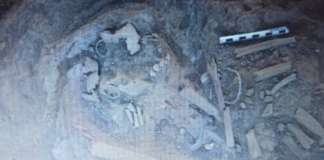In a letter to Secretary of State Antony Blinken, Representative Adam Schiff (D-CA) and a bipartisan group of forty-seven of his House colleagues urged the United States to prioritize the protection of at-risk Armenian heritage sites in Artsakh during all future diplomatic engagements with Azerbaijani officials, reported the Armenian National Committee of America (ANCA).
In the June 24th letter, Rep. Schiff and his colleagues write, “With the Azerbaijan military offensive against Artsakh in September 2023, there is already evidence Azerbaijan is continuing its strategy of erasing Armenian culture within and around this region as well.” The lawmakers stressed, “In the face of these significant risks to Armenian cultural heritage, we write this letter to express our deep concern that the Department of State must do more to prevent Azerbaijan’s actions. Even as your senior diplomats meet with Azerbaijani officials, it is unclear if these concerns are being raised, or are raised with the appropriate level of seriousness that the issue deserves.”
The forty-seven colleagues joining Representative Schiff in urging the U.S. to protect Artsakh’s Armenian heritage are Representatives Gabe Amo (D-RI), Jake Auchincloss (D-MA), Joyce Beatty (D-OH), Don Beyer (D-VA), Sanford Bishop (D-GA), Brendan Boyle (D-PA), Tony Cardenas (D-CA), Greg Casar (D-TX), Sean Casten (D-IL), Judy Chu (D-CA), Lou Correa (D-CA), Jim Costa (D-CA), Danny Davis (D-IL), Anna Eshoo (D-CA), Dwight Evans (D-PA), Jimmy Gomez (D-CA), Josh Gottheimer (D-NJ), Jonathan Jackson (D-IL), Sara Jacobs (D-CA), Andy Kim (D-NJ), Raja Krishnamoorthi (D-IL), John Larson (D-CT), Barbara Lee (D-CA), Susie Lee (D-NV), Stephen Lynch (D-MA), Seth Magaziner (D-RI), Tom McClintock (R-CA), James McGovern (D-MA), Rob Menendez (D-NJ), Grace Meng (D-NY), Seth Moulton (D-MA), Grace Napolitano (D-CA), Eleanor Holmes Norton (D-DC), Ilhan Omar (D-MN), Frank Pallone (D-NJ), Scott Peters (D-CA), Katie Porter (D-CA), Linda Sanchez (D-CA), John Sarbanes (D-MD), Janice Schakowsky (D-IL), Brad Schneider (D-IL), Elissa Slotkin (D-MI), Haley Stevens (D-MI), Dina Titus (D-NV), Lori Trahan (D-MA), David Valadao (R-CA), and Susan Wild (D-PA).
The letter specifically highlights the systematic destruction of Armenian heritage in Nakhichevan between 1997 and 2011, as well as the recent destruction of the St. John the Baptist church in the city of Shushi (also known as Kanach Zham). It also notes that Azerbaijan has often attempted to mask the destruction of Armenian cultural heritage by calling its activities “restoration” of historical sites – as well as erasing Armenian heritage by claiming sites are of “Caucasian Albanian” origin. Nearly 500 Armenian cultural heritage sites are at risk following Azerbaijan’s ethnic cleansing of Artsakh – including some of the world’s oldest churches and monasteries dating back to the 4th century, and intricately carved khachkars (cross-stones) that have been inscribed by UNESCO on the Representative List of the Intangible Cultural Heritage of Humanity.
“There is no clearer proof of Azerbaijan’s genocidal intent than its systematic effort to erase every last trace of Armenian civilization across Artsakh – just like successive Turkish governments did in the wake of the Armenian Genocide,” remarked Aram Hamparian, Executive Director of the ANCA. “We applaud Representative Schiff’s leadership in ensuring the protection of Armenian cultural heritage, and value his continued efforts to hold Azerbaijan accountable for its crimes against humanity.”
Congressman Schiff’s letter comes on the heels of the visit of U.S. Ambassador Mark Libby to the Artsakh city of Shushi last month. Just four days prior, Ambassador Libby had stated he would not “play a part in a propaganda show” when asked if he planned to visit regions subjugated by Azerbaijan during the 2020 Artsakh War and September 2023 assault on Artsakh. The visit of a senior U.S. diplomat to Shushi – a town that was ethnically cleansed of its Armenian population, and the site of recent acts of cultural destruction – at Azerbaijan’s behest contributes towards normalizing Azerbaijan’s genocidal conduct while undermining trust in U.S. diplomacy in the region. The visit also marks a clear departure from U.S. Assistant Secretary for Europe and Eurasia James O’Brien’s commitment that there would be “no business as usual” with Azerbaijan following its ethnic cleansing of Artsakh.
The destruction of Armenian cultural heritage is the subject of a case against Azerbaijan at the International Court of Justice (ICJ), which issued a provisional measure in December 2021 that calls for Azerbaijan to refrain from “suppressing the Armenian language, destroying Armenian cultural heritage or otherwise eliminating the existence of the historical Armenian cultural presence.” Following Azerbaijan’s military attack on Artsakh, the ICJ issued another provisional measure in November 2023, calling on Azerbaijan to adhere to its obligations under the International Convention on the Elimination of All Forms of Racial Discrimination by taking “all necessary measures to prevent and punish acts of vandalism and desecration affecting Armenian cultural heritage, including but not limited to churches and other places of worship, monuments, landmarks, cemeteries and artifacts.”
On June 24th, Caucasus Heritage Watch (CHW), a research program in heritage forensics led by archaeologists at Cornell and Purdue Universities, issued their seventh monitoring report detailing the status of Nagorno Karabakh’s at-risk cultural heritage sites. “We are deeply concerned that the total number of destroyed heritage sites rose by 75% between our Fall 2023 and Spring 2024 missions, along with a 29% increase in sites classified as threatened,” stated report authors. In addition to the 1847 Surb Hovhannes Mkrtich Church (Kanach Zham) church in Shushi, the CHW team recorded the destruction of five other Armenian cultural heritage sites in Nagorno Karabakh in Spring, 2024, including the 18-19th century Surb Ghazanchetsots cemetery in Shushi, three Khatchkars (cross-stones) in Kohak, a 19th to early 20th-century cemetery near Aknaghbyur, and two schools in Tsar and Chragh, and the entire village of Karin Tak.














